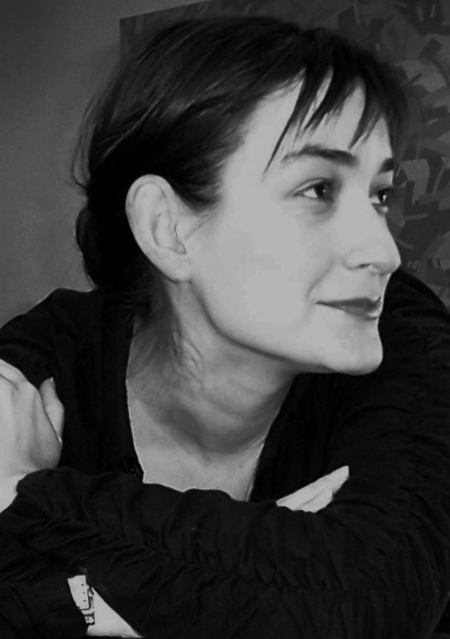Cows calve, horses foal, goats kid, but women do not child.Another verb separates us from the noun of it, a distance betweencells that split in my body, my body, and her wet fur on my stomach.I spent all morning as an animal, all afternoon coveringthat knowledge up with dirt and sticks. I scratchedout a hole to bury my shame in. Someday my boneswould be gnawed at by something with fur. I tastedbitter adrenaline down my throat. I laid with youhaunch to haunch and rolled back my reason. Once our speciescould cooperate, we could drop bombs, invent plastic, extractfossil fuels, burn and burn. Books showed species that coulddecimate a herd. Our forward-facing eyes made us predator, butit all seemed long ago: before we’d transcended to theseinsulated rooms and screens. We studied bodies we’d madeextinct as a hobby. It seemed impossible we were stillroaming the countryside, still on the ships with such largeholds. The animals my daughter loves best she distorts with love:bear’s fur matted under an arm, skunk’s head misshapenwith sleep. I watch her menagerie fray, try to rethreadthe monkey’s arm to its body, brush out the horse’s tangleof plastic mane. In her room, I can repair a species. When shegets older someone will tell her how to groom the animal offof herself. My body took calcium from my body to make hermilk, I nursed her with my bones. The verb nurse means to carefor in illness, to drink too long a single drink, to keepa grudge too closely. Her cells and mine changed places,I extracted my elements to feed her. What could bewilder than the body of a mother? Believe in my bones the riskI feel. Weather the new war our culture tells us not to speakof. But my body knows to go outside in an earthquake, to huddledown when the wind blows. To bite. To keen. To howl.
How to Abandon Ship
Feature Date
- December 7, 2019
Series
Selected By
Share This Poem
Print This Poem
Copyright © 2019 by Sasha West
All rights reserved.
Reproduced by Poetry Daily with permission.

July/August 2019, Vol. 48, No. 4
Philadelphia, Pennsylvania
Editor
Elizabeth Scanlon
The American Poetry Review is dedicated to reaching a worldwide audience with a diverse array of the best contemporary poetry and literary prose. APR also aims to expand the audience interested in poetry and literature, and to provide authors, especially poets, with a far-reaching forum in which to present their work.
APR has continued uninterrupted publication of The American Poetry Review since 1972, and has included the work of over 1,500 writers, among whom there are nine Nobel Prize laureates and thirty-three Pulitzer Prize winners.
Poetry Daily Depends on You
With your support, we make reading the best contemporary poetry a treasured daily experience. Consider a contribution today.




